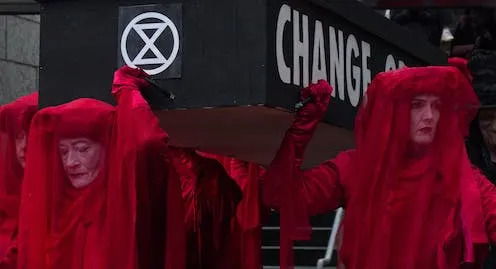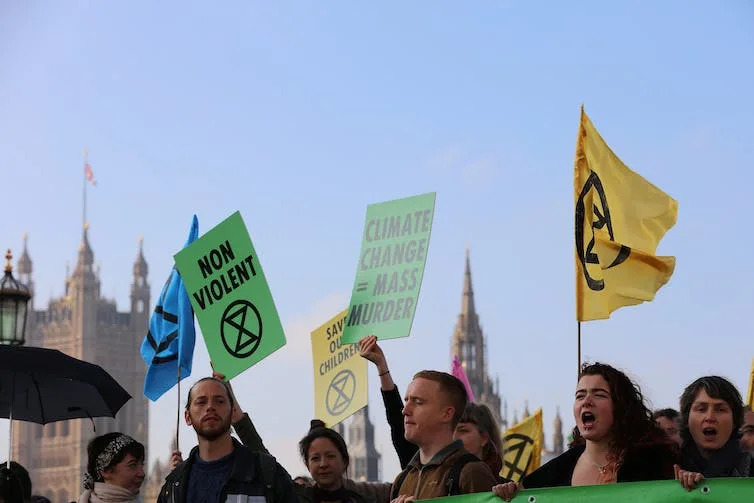THE NEED FOR A REVOLUTIONARY ORG
Extinction Rebellion says 'we quit' – why radical eco-activism has a short shelf lifeMarc Hudson, Research Fellow in Industrial Decarbonisation Policy, University of Sussex
Thu, 5 January 2023

Margarita Young / shutterstock
The protest group Extinction Rebellion (XR) has released a statement with the clickbait headline “We Quit”. Dashing the hopes of climate denialists everywhere, the group is not shutting up shop (yet), it is merely changing tactics. XR is keeping its options open, saying there is “a controversial resolution to temporarily shift away from public disruption as a primary tactic”.
The statement comes at a time when activists from affiliated groups Insulate Britain and Just Stop Oil are still serving jail terms.
As someone who has been involved in these sorts of movements for 20 years, both as an activist and through my All Our Yesterdays climate history project, XR’s move doesn’t really surprise me. The truth is that such movements rarely last more than a few years, even if their cause remains just as urgent. It’s simply too hard to retain committed activists.
Extinction Rebellion itself nicely highlights the cyclical nature of radical environment action.
Protests and occupations
In the summer of 2018, the UK baked in a heatwave as the IPCC was putting the finishing touches to a report about what would happen if global warming exceeded 1.5℃ (short version: buckle up). Meanwhile, stickers with the now familiar stylised hourglass began to appear on lampposts, and news trickled out of a new group called “Extinction Rebellion”.

Protesters with UK parliament building in background
Over the following year, XR staged protests in Westminster, and occupied bridges and other key sites across London for days on end. Greta Thunberg, by now a sensation for her school strikes, addressed the crowds, and the actress Emma Thompson flew in from Los Angeles.
But an October 2019 “rebellion” was markedly less successful than the first ones. The Metropolitan Police had learned. It raided logistics hubs and issued preemptive banning orders (later successfully legally challenged). But the most damaging moment came as an own goal, when a splinter group undertook a notorious blocking-a-commuter train action, generating lots of media criticism and internal soul-searching about the pros and cons of “decentralised” movement activity.
Then came the pandemic and XR’s favoured tactics of mass mobilisation were rendered impossible – though attempts were made. Meanwhile, somebody put out fake leaflets linking the group to eco-fascist arguments.
This history – a sudden flourishing, followed by gradual fizzling out – is sadly fairly typical.
Direct action in the UK
In the early 1990s, people in the UK began taking environmental action. These actions can be seen as a continuation of the 1980s peace movement, of which the women’s camp at Greenham Common had been an inspiration and focal point.
Three decades ago this month a “Wake up the world is dying” protest took place in London to highlight rainforest deforestation and the importation of mahogany. There were many protests against new roads through woodlands. By the late 1990s, with international climate negotiations proving inadequate, the Rising Tide network sprang up, taking direct action across the country.
Activists from Rising Tide were then part of the Camp for Climate Action group in the 2000s, which emerged after the G8 protests in Scotland as some thought that groups were stuck in a rut of “summit hopping” and wanted to be more radical.
Climate Camp ran from 2006 to 2010, with protests at Drax and Kingsnorth power stations, Heathrow Airport, London and then Edinburgh. In 2011, after what was by accounts a gloomy but determined meeting, those present released a statement called “Metamorphosis”, which has language eerily similar to XR’s We Quit statement. It said its closure was “intended to allow new tactics, organising methods and processes to emerge in this time of whirlwind change”.
Through the 2010s groups such as No Dash for Gas and Reclaim the Power kept doing nonviolent direct action, joined by the ultimately successful anti-fracking movement. In the midst of this, attempts to use the Paris Climate Conference in 2015 as a way of kickstarting renewed activity were not successful.
Up like a rocket, down like a stick
Why does the pattern, what I call the “emotacycle” keep happening? One factor is how hard it is to retain committed activists. To quote myself from a December 2019 debate in New Internationalist about whether XR had the right tactics:
the emotional dynamics seem unchanged to me – a hardcore of “heroic types”, and a worried but unempowered wider community that can never see themselves doing yoga in a prison cell, [who] come to one meeting, feel alienated and don’t come back.
I went on to say that “previous cycles of climate protest tended to last three years or so”. Three years on, it seems XR has indeed followed this pattern.
XR’s “We Quit” statement also contains a teaser and an invitation to gather back at Parliament Square in Westminster, four and a half years on from the initial “Declaration of Rebellion”. A year ago the group was saying it would bring “millions” onto the streets in September. Now the number it is hoping for is 100,000.
Those predictions are still optimistic, shall we say. But other predictions made by those working on climate change – of increased emissions and an ever thicker blanket of greenhouse gases in the atmosphere, trapping heat and causing floods and fires to be more intense and more frequent – are safer. Whether, in light of that, our civilisation is safe is another question.
This article is republished from The Conversation under a Creative Commons license. Read the original article.

The Conversation
Marc Hudson was a co-founder of Climate Emergency Manchester, but is no longer involved with the group.
No comments:
Post a Comment